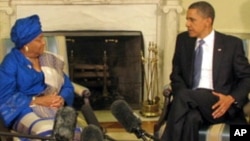Liberia said it has made “proper representation” to the US embassy seeking clarification on why the visas of three senior government officials were revoked after they had left Liberia.
The three officials including Associate Supreme Court Justice Kabineh J’aneh, Youth and Sports Minister Eugene Nagbe, and Senator Geraldine Doe-Sheriff.
All three once had some affiliation with different rebel groups during Liberia’s civil war, which lasted from 1989 to 2003.
The visa dispute, and the arrest and detention in May this year of Jucontee Thomas Woewiyu, Charles Taylor’s former defense minister, indicate the Obama administration may be ready to go after Liberians accused of war crimes.
Liberia’s Information Minister, Lewis Brown, described the visa incident as serious. He said his government wants to know what really happened.
“So far, we have made the proper representation through the Ministry of Foreign Affairs to the American Embassy accredited near our capital seeking information on the revocation of visas of at least three individuals who are serving at very high levels in the government. We are still waiting for feedback from the embassy,” he said.
J’aneh was reportedly told his visa was canceled upon arrival in France enroute to the United States. Nagbe learned of his visa revocation after arriving in the United States, while Doe-Sheriff was stopped in Accra, Ghana.
Brown said Monrovia remains hopeful the visa issue is simply the result of a misunderstanding.
“We know that at least three senior officials’ visas were revoked. It is within the purview of the Ministry of Foreign Affairs to make such representation and to get the information. Until we do, we’d like to think there may have been some misunderstanding, a processing issue perhaps,” he said.
Woewiyu was arrested last May in Newark, New Jersey and charged with “lying on his application for U.S. citizenship by not disclosing his alleged affiliation with a violent political group in Liberia”, according to U.S. Immigration and Customs Enforcement (ICE).
In 2012, the US government deported George Boley, former leader of the Liberia Peace Council, and was found to have recruited and used child soldiers in military operations undertaken by the Peace Council during the country’s civil war.
ICE said Boley’s deportation was the first removal order it had obtained under the Child Soldiers Accountability Act of 2008.
In 2009, a court in Miami convicted former Liberian President Charles Taylor on six counts of committing acts of torture and conspiracy to commit torture.
He was the commander of the notorious Anti-Terrorism Unit that suppressed opposition to his father’s regime. Taylor was sentenced him to 97 years.
Brown said the Liberian government is unaware whether the visa revocations were part of an overall US commitment to root out alleged human rights violators who may be trying to seek refuge in the United States.
“We’ve heard about all these speculations; we do not rush to any conclusion. And so, what we want to do is to, as we’ve done, do a formal request for information about what may, or may not, have occurred. I think people are running to conclusions and may find it totally unnecessary in the end,” Brown said.
He said the Liberian government has made the necessary representation to the US Embassy and expects to get the results soon. After that, Brown said, the government will inform its citizens about what really transpired.
As President Ellen Johnson Sirleaf prepares to travel to Washington for next month’s US-Africa summit, one local report said the visa incident might have forced the president to make some adjustments in members of her delegation. FrontPage Africa, a Liberia online publication, reports she dropped Brown from the delegation.













